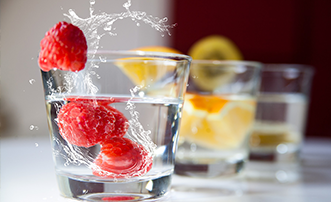It is very important for us to stay hydrated all year round, but especially in the cold winter months. Our bodies need to be hydrated even if we may feel less thirsty in cooler weather than in warm summer months. In warm months, we feel thirstier and sweat is a good indication that we are losing hydration. In winter months, we don’t sweat as much, but we are still loosing hydration from breathing in cold, dry air.
Not staying hydrated can make us feel hungry when we may not really be and can cause us to have low energy levels. Staying hydrated also helps boost our immune system during cold and flu season. Lack of water can dry out the mucous membranes in our lungs and sinus passage which can reduce their resistance to infections. Getting enough hydration also helps to regulate our body temperature, allowing our blood to carry important nutrients and oxygen around our bodies as well as removing toxins.
It is recommended to drink 8 glasses of water per day.
Make it convenient to drink!
To reach 8 glasses per day try to keep water by you at all times.
Add fresh fruit to your water for flavor.
Fresh lemons, limes, oranges, and strawberries or even cucumber can make it refreshing! You could also add a powder flavoring to your water such as True Lemon or Crystal Light. If you find a flavoring you like, be sure to check the amount of sugar in it.
Milk and juice are also good options for hydration.
Be aware of how much you are drinking. Milk contains fat in varying amounts depending on the type of milk and juice contains added sugar depending on the type of juice.
Water and fluids don’t have to be cold to count.
A warm beverage with little to no added sugar, such as hot tea, is an easy way to warm up and hydrate. Any type of tea is great to hydrate, caffeinated and decaf teas work equally well. Each type of tea has disease-fighting polyphenols and flavonoids. These antioxidants seek out cell-damaging free radicals and destroy them.
Eat foods that contain high amounts of water.
• Cucumber – 96% water
• Tomato – 95% water
• Spinach and romaine lettuce – 93% water
• Zucchini – 92% water
• Strawberries and broccoli – 90% water
Source: waterlogic.com




